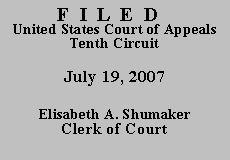

| UNITED STATES OF AMERICA,
Plaintiff-Appellee, v. DIANE C. CHRISTENSEN, |
|
sentencing . . . ." Motion to Enforce, Attachment A (Plea Agreement) at 3. The district court determined a guideline range of 41 to 51 months and imposed a sentence of 41 months, well within the five-year statutory maximum recited in the plea agreement and at the low-end of the guideline range. Nonetheless, defendant appealed. The government has now moved to enforce defendant's appeal waiver under United States v. Hahn, 359 F.3d 1315 (10th Cir. 2004) (en banc). We grant the motion and dismiss the appeal.
Under Hahn, we consider "(1) whether the disputed appeal falls within the scope of the waiver of appellate rights; (2) whether the defendant knowingly and voluntarily waived his appellate rights; and (3) whether enforcing the waiver would result in a miscarriage of justice." Id. at 1325. Defendant contends that her appeal does not fall within the terms of the appeal waiver she accepted, and that her waiver of appeal rights was not knowingly and voluntarily entered because she did not waive the right to appeal an illegal sentence. She claims that her sentence is illegal under Blakely v. Washington, 542 U.S. 296 (2004), and United States v. Booker, 543 U.S. 220 (2005), because the district court may have enhanced her sentence based on facts not found by a jury.
Defendant's argument is patently without merit. A sentence is illegal if it "is ambiguous with respect to the time and manner in which it is to be served, is internally contradictory, omits a term required to be imposed by statute, is uncertain as to the substance of the sentence, or is a sentence which the judgment of conviction did not authorize." United States v. Dougherty, 106 F.3d 1514, 1515 (10th Cir. 1997) (quotation omitted); see also United States v. Gonzalez-Huerta, 403 F.3d 727, 739 n.10 (10th Cir.) (holding term "illegal sentence" is reserved for instances where sentence exceeds statutory maximum), cert. denied, 126 S.Ct. 495 (2005). Defendant does not argue, nor do any of the materials submitted to us suggest, that her sentence is deficient in any such fundamental respect.
Moreover, as noted, defendant expressly agreed to waive her right to appeal "the manner in which the sentence is determined, . . . , except . . . [for] (1) a sentence above the maximum penalty provided in the statute of conviction . . . , and (2) a sentence above the high-end of the guideline range as determined by the district court at sentencing." Plea Agreement at 3. Defendant's sentence is within the statutory maximum and at the low-end of the guideline range. The plea colloquy demonstrates that defendant knowingly and voluntarily agreed to this appeal waiver. Thus, the sentence imposed complies with the terms of the plea agreement and the understanding expressed by the defendant at the plea hearing. Defendant has not demonstrated that her appeal falls outside the scope of waiver or that she did not knowingly and voluntarily agree to the appeal waiver.
Accordingly, the government's motion to enforce the waiver is GRANTED and the appeal is DISMISSED. The mandate shall issue forthwith.
ENTERED FOR THE COURT
PER CURIAM
*. This panel has determined unanimously that oral argument would not materially assist the determination of this appeal. See Fed. R. App. P. 34(a)(2); 10th Cir. R. 34.1(G). The case is therefore ordered submitted without oral argument. This order and judgment is not binding precedent, except under the doctrines of law of the case, res judicata, and collateral estoppel. It may be cited, however, for its persuasive value consistent with Fed. R. App. P. 32.1 and 10th Cir. R. 32.1.